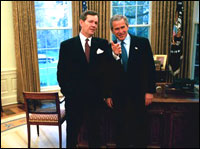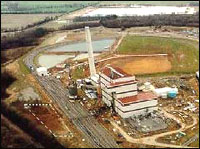This election year, U.S. EPA chief Mike Leavitt is playing the part of a Clean Air Act tough guy.

Leavitt, left, with Bush, is acting tough.
Photo: White House.
For three years, the Bush administration and the power industry have been happily entangled in a session of mutual back-scratching — utilities have been generous contributors to Bush and his Republican cohorts, and the administration has conspicuously refrained from filing a single lawsuit against an over-polluting power plant. But last month, Leavitt stirred things up by taking a no-more-Mr.-Nice-Guy stance with utilities; he called on them to clean up their facilities and announced that the administration would take legal action against violators of the Clean Air Act’s New Source Review rule. Last week, right on cue, the Justice Department slapped a lawsuit on a Kentucky power co-op for violating NSR by expanding two of its coal-burning plants without installing the required anti-pollution equipment.
Enviros can be forgiven for greeting this newfound green zealotry with a dose of skepticism. The Bush administration has consistently echoed industry complaints that NSR is busting utilities’ purse strings, and last summer the EPA approved rule changes that would make it easier for power plants to boost production while avoiding pricey pollution-scrubbing technology. On Nov. 5 of last year, the day before Leavitt stepped into office, the EPA’s top enforcement official revealed plans to halt backlogged investigations of 50 or more power plants and possibly scrap 13 other NSR cases that the Justice Department had been asked by the Clinton administration to pursue.
The Bush administration only started singing a slightly different tune after a federal appeals court on Christmas Eve temporarily blocked implementation of the EPA’s NSR overhaul, siding with a number of states and environmental groups. Leavitt’s response was contradictory: He appealed the court’s ruling, but publicly made a show of pledging to enforce the stronger NSR regulations until the court made its final decision.

My old Kentucky coal-fired power plant.
Photo: DOE.
To make good on that pledge, the Bush administration undertook prosecution of the East Kentucky Power Cooperative. However, skeptics point out that the Kentucky utility is a co-op, and co-ops don’t belong to the utility industry’s most powerful lobbying arm, the Edison Electric Institute, which makes them virtually impotent in the political arena. Moreover, Kentucky Power is located in a solidly Republican state, so this case is not likely to cost Bush any electoral votes.
“The big question is, why choose this Kentucky co-op?” asked Kevin Curtis, vice president of public affairs for National Environmental Trust. “First off, this is a very dirty co-op that would be in violation of even their new weaker rules. It would have been a much bigger statement if the administration had gone after any one of the 70 cases they dropped in November. This list includes a number of large, politically powerful utilities that are in clear violation of the existing NSR rules, such as the American Electric Power plant in Ohio. It seems the EPA simply isn’t willing to take that political risk.”
Chris Miller, a senior staffer for the Senate Environment and Public Works Committee, said the agency had in the past estimated that 70 percent of the utility industry was not complying with NSR rules. “So the question is just how many of the mega-polluters the EPA decides to bring to justice.” Hitting one polluter here or there, said Miller, by no means ensures that the agency has a sound policy that it’s willing to enforce across the board.
Curtis concludes that the administration is merely trying to construct an image of a greener, meaner election-year EPA. “Simply put, [the Kentucky Power case] appears to be part of a larger PR initiative to try to do damage control on Bush’s environmental image now that the heat is on from the primaries,” he said. The same week the suit was announced, the administration unveiled, with great fanfare, funding increases for environmental projects in a number of swing states, including a clean-bus initiative in Pennsylvania, Great Lakes cleanups, a salmon restoration project in the Northwest, and Everglades conservation in Florida.
When Muckraker asked the Department of Justice how many additional NSR cases the administration planned to pursue, spokesperson Blaine Rethmeier said that for now Kentucky Power was it — there aren’t likely to be more actions any time soon. “We have limited resources,” he explained. “At the moment, we’ve got eight backlogged cases [from the Clinton administration] that we are still litigating. It takes a long time to move these cases forward.”
Sylvia Lowrance, former head of enforcement at the EPA, warned against losing sight of the big picture. “The EPA is still in court supporting a rule that undercuts the cases [against NSR violators] — and the mere filing of one or two cases won’t overturn that fact,” she said. “We’re talking about seriously mixed messages here. Then again, it’s an election year. Strange things happen in an election year.”


